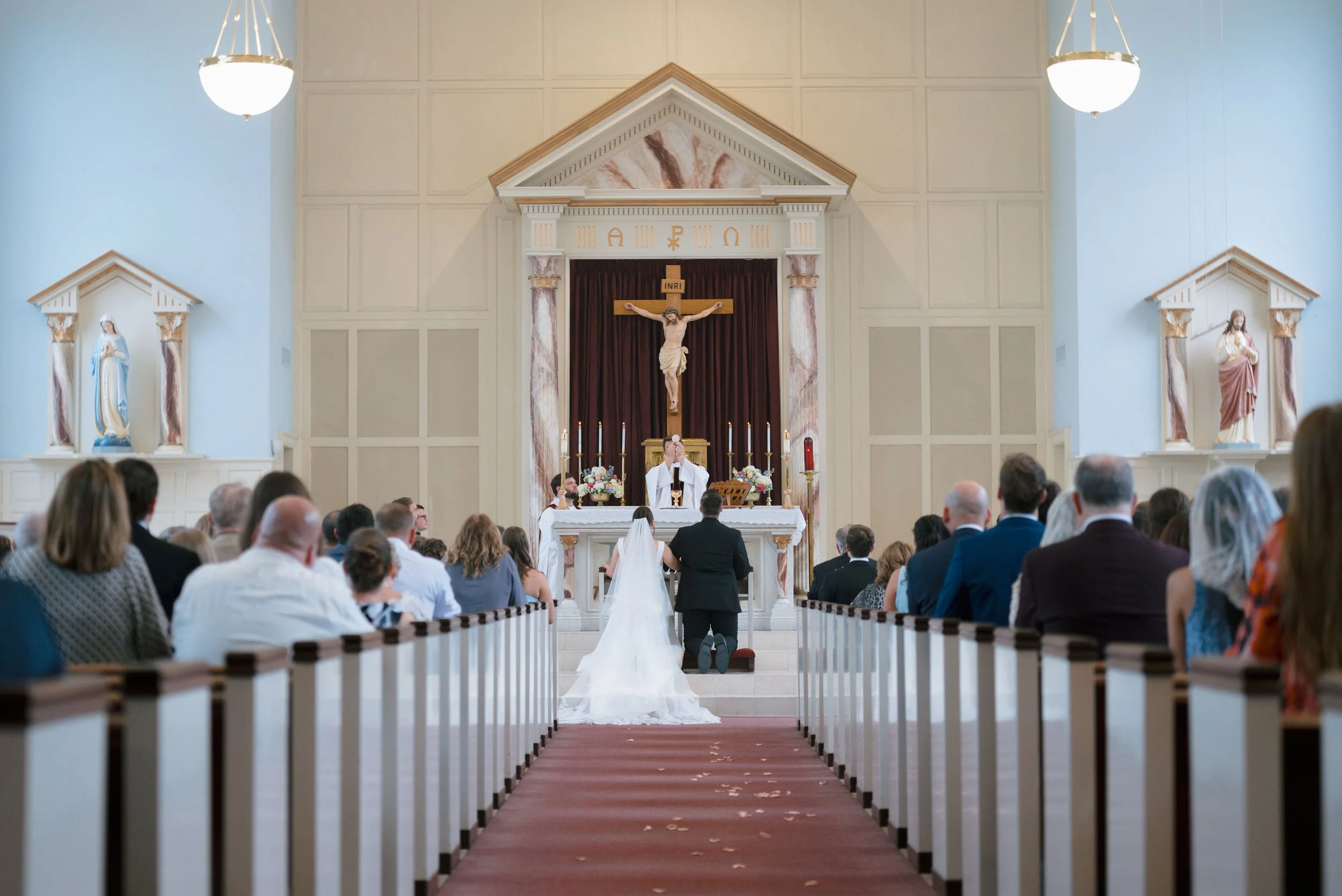
Things Catholics Need to Know
About Getting Married
FAQ’s answered by our Director of Marriage Preparation, Kevin Pesek!
Howdy friends,
As the Director of Marriage Preparation here at St. Mary’s, I meet with approximately 1 newly engaged couple per week and get to explain what the marriage preparation process looks like. This is usually brand new information for couples, even if they are both Catholic. Sometimes it’s a relief for them because it’s easier than what they thought, and sometimes it’s a problem because they already made some decisions without knowing some crucial information.
What I’d like to do is explain to you some helpful pieces of information for getting married in the Catholic Church. These rules should pretty much apply universally here in the United States, so even if you aren’t getting married soon, it’s good information for you to have.
-Kevin Pesek
Director of RCIA and Marriage Preparation
Rules to know before Catholics get Married:
Rule #1: After you get engaged, figure out where you want to get married and contact the church BEFORE DOING ANYTHING ELSE.
I cannot emphasize how important this is. Before you book a venue for the reception, before you put a deposit down on catering, before you mail out save-the-dates, call the church and set up a meeting with the priest or marriage coordinator. Most churches require at least 6 months of preparation before getting married, and some churches require more than that. Remember, you are receiving a sacrament, and the Church wants to make sure that you are prepared to receive the graces offered. The Church asks priests to usually prepare for approximately 8 years before being ordained. So contact your church first. Chances are that you aren’t the only couple getting married at this church, and your first preference for a wedding date might not be available. Book your church first and then plan the other stuff. Remember, put God first.
Rule #2: You can do your marriage preparation at one church and then get married at a different church.
Many of our couples here at St. Mary’s do this. They do their preparation while they are students, but they want to get married in their church back home. This is perfectly fine! As long as you clear it with the priest/deacon performing the marriage ceremony, we will send all of your completed paperwork and proof of preparation to them.
Rule #3: Your marriage ceremony MUST take place within “sacred space.”
If you and your future spouse are Catholic, the ceremony must happen within a Catholic Church. Not on a beach, not at your beautiful reception venue, not at the courthouse, not at a random “wedding chapel,” and not on Kyle Field. You are making a commitment to each other before God and before the Church community. If you are marrying someone who is not Catholic, your local bishop may give permission for you to get married in a non-Catholic church, but it still has to be a church (sacred space). This one can be pretty complicated, so if you aren’t sure, just ask us! The other important thing to note is that you can only have ONE marriage ceremony. So you can’t have a religious ceremony at the church for family and then another civil ceremony at the venue for everyone else. You only get married once, and you only say your vows once. For a Catholic, the religious ceremony is the civil ceremony.
Rule #4: If your future spouse is not Catholic, they do NOT have to convert to Catholicism in order for you to marry them.
While it is certainly a prudent idea to believe in the same religion and “be on the same page” in regards to how you live your life and how you raise your kids, it is not a wise decision to “convert” for your future spouse. The only reason anyone should convert to Catholicism is because they feel that God is calling them to do so, not because you or their future mother-in-law wants them to. If the non-Catholic is validly baptized, it is still a sacramental marriage, and God’s grace is given to the couple. It is not a “less holy” marriage than a marriage between two Catholics or anything like that. In fact, you don’t even need to have a wedding mass; you are actually encouraged to have a Liturgy of the Word service so that your non-Catholic spouse is not excluded from communion. But, if you are interested in becoming Catholic or just want to learn more about the Catholic faith, check out our RCIA program.
Rule #5: If your future spouse is not Catholic, you are still obligated to raise your children as Catholics.
In the presence of the non-Catholic, the Catholic spouse will make a solemn promise to do all in his/her power to baptize and raise the children in the Catholic faith. This does not mean that the non-Catholic spouse has to convert, or that they have no role to play in the religious upbringing of their own children. A non-Catholic Christian is perfectly capable of teaching their children how to love God, how to serve others, and how to pray. However, it should come as no surprise that the Catholic Church believes it is the true Church founded by Jesus Christ, and its members are obligated to propagate that truth, even if that is in opposition to other churches. I would hope that every Christian believes that about his/her own church. But to be frank, if a Catholic doesn’t believe that the fullness of truth subsists in the Catholic Church and has hesitations about passing on that faith to their children, they need to examine why they are getting married in the Catholic Church in the first place. A good analogy is the choice to vaccinate your kids (not trying to get political here). If one parent wants to vaccinate and the other parent is against it, that’s a problem. You can’t meet halfway; it’s either all or nothing. If you are absolutely convinced about the necessity of a vaccine for yourself and for the well-being of your children, it doesn’t make any sense for you to simply concede to your spouse’s beliefs. And it certainly doesn’t make any sense to let your children decide when they are old enough if they want to get vaccinated. It’s something you and your future spouse have to agree on before you get married. And if you are fully committed to having your kids vaccinated (raising them Catholic), you might not be able to marry someone who feels the opposite way. There is no checklist of what it means to raise your kids Catholic, but it needs to be done with the support of both spouses. Again, it’s a promise you make before God, and it is to Him that you will need to give an account.
Rule #6: As a Catholic, you do NOT need to be confirmed in order to be married.
Now, I want to be careful here. You should be confirmed if you are a practicing Catholic, and it is crucial to the success of your future marriage to avail yourself of all the grace (help) that God offers you, including the grace of your Confirmation. But, it goes against the very purpose and meaning of a sacrament if you are “forced” to receive it. If you feel that God is calling you to receive the sacrament of marriage, you should get married. But, it is also worth pondering and praying about why God would call you to that sacrament and not call you to be confirmed. If you’d like more information on receiving the sacrament of Confirmation, click here.
Rule #7: In the United States, priests/deacons have the power to both legally and sacramentally marry you.
In other words, you do NOT need to get civilly married before you have your “religious” wedding. When you say your vows at the church, the priest signs your marriage license and you are legally married at that point. And to reiterate a previous point, you can only have one ceremony. You can’t have a religious ceremony and then a civil ceremony. A civil marriage is not a sacramental marriage in the eyes of the church; and if you are only civilly married, you should not be living as a married couple. If you are already civilly married, you would prepare to participate in a convalidation, which is a similar process to marriage prep.
I know that was a lot of stuff, and some of it probably doesn’t apply to you. But, I hope it at least gave you some idea of what to expect and keep in mind as you discern marriage. If you have any questions, please don’t hesitate to reach out to us here at St. Mary’s.
